
Synopsis
"There is a great need for critical thinking in schools, and by teachers. Current educational reform efforts emphasize student testing on basic information and rote memorization. What is lost is education that involves critical thinking, creativity, andconsideration of alternatives. The essential framework for this book is the stimulation of critical thinking--to include dialogue and dialectic approaches. Critical Issues in Education includes opposing sides of the issues presented and illustrates, through competing essays on each topic, how critical thinking, dialogue, and dialectic approaches improve understanding and the evaluation of available evidence and reasoning. "--
"synopsis" may belong to another edition of this title.
From the Publisher
The fourth edition includes updated research and scholarship and updated bibliographic references.
Three new chapters explore the pros and cons of 'Beginning Reading - Is there one best approach to literacy?', 'Gender - Should gender differences affect schools and schooling?', and 'Mainstreaming and Inclusion - How should we provide for students with special needs?'.
Comprehensive and Flexible -Balanced, pro-and-con coverage is given to the most hotly debated issues in education today. The modest price permits it to be used either as a core text in issue-oriented courses or as a supplement in courses devoted partly to issues.
Integrating Themes -Each of the book's major parts begins with a chapter-length introduction that provides background information and introduces a theme that ties the issues together.
Critical Thinking Skills -Each of the book's issues chapters presents two convincingly argued, alternative positions on a particular issue. The idea is not only to inform the reader about the issues but, through the debate format, force the reader to weigh the arguments, seek additional information, and come up with his or her own position.
Organizing Framework -The issues have been arranged in a macro-to-micro scheme. They move from a consideration of the overall purposes of schooling to the curriculum, teaching, and evaluation considerations that flow out of those purposes.
About the Author
Jack L. Nelson a professor of education at Rutgers, obtained his doctorate from the University of Southern California. He is experienced teacher in schools at the elementary, secondary, undergraduate, and graduate levels; his university teaching experience includes California State University, Los Angeles; the State University of New York at Buffalo; San Jose State University; and Cambridge University. Nelson has been a visiting scholar at the University of California, Berkeley; Stanford University, University of Colorado; and Curtin University and the University of Sydney in Australia. Critical Issues in Education is his sixteenth book; he has also published about 150 articles and reviews. He is listed in Who’s Who in America and Contemporary Authors.
Stuart B. Palonsky is professor of education and director of the Honors College at the University of Missouri-Columbia. A former public school teacher in New York and New Jersey, Palonsky earned his doctorate at Michigan State University. His publications include 900 Shows a Year, an ethnographic study of high school teaching from a classroom teacher’s perspective. In addition, Palonsky has published numerous articles and reviews in educational and social science journals, and has presented scholarly and professional papers on educational issues at national association conferences.
"About this title" may belong to another edition of this title.
Other Popular Editions of the Same Title
Search results for Critical Issues in Education: Dialogues and Dialectics
Critical Issues in Education D
Seller: World of Books (was SecondSale), Montgomery, IL, U.S.A.
Condition: Good. Item in good condition. Textbooks may not include supplemental items i.e. CDs, access codes etc. Seller Inventory # 00090938339
Critical Issues in Education: Dialogues and Dialectics
Seller: Used Book Company, Egg Harbor Township, NJ, U.S.A.
Condition: LikeNew. Shows very minimal signs of wear and previous use. A portion of your purchase benefits nonprofits! - Note: Edition format may differ from what is shown in stock photo item details. May not include supplementary material (toys, access code, dvds, etc). Seller Inventory # 584R0H0007J6_ns
Critical Issues in Education: Dialogues and Dialectics
Seller: New Legacy Books, Annandale, NJ, U.S.A.
paperback. Condition: Good. There is light highlighting or handwriting through out the book. No online access code, it has been used. Fast shipping and order satisfaction guaranteed. A portion of your purchase benefits Non-Profit Organizations, First Aid and Fire Stations! Seller Inventory # 5FSZKH000ZZD
Critical Issues in Education: Dialogues and Dialectics
Seller: ThriftBooks-Dallas, Dallas, TX, U.S.A.
Paperback. Condition: Very Good. No Jacket. May have limited writing in cover pages. Pages are unmarked. ~ ThriftBooks: Read More, Spend Less. Seller Inventory # G0072555114I4N00
Critical Issues in Education: Dialogues and Dialectics
Seller: BennettBooksLtd, San Diego, NV, U.S.A.
Paperback. Condition: New. In shrink wrap. Looks like an interesting title! Seller Inventory # Q-0072555114

